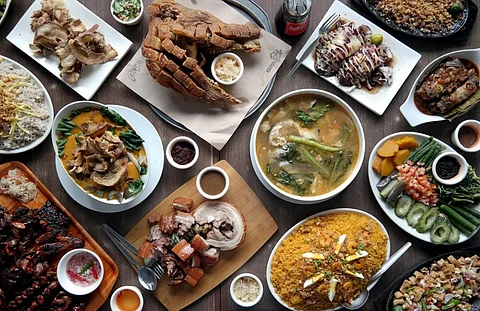
- NEWS
- the EDIT
- COMMENTARY
- BUSINESS
- LIFE
- SHOW
- ACTION
- GLOBAL GOALS
- SNAPS
- DYARYO TIRADA
- MORE

The Senate on Monday approved a measure seeking to recognize Pampanga as the country’s “culinary capital” due to its rich and diverse cuisine that has contributed significantly to Filipino gastronomy and cultural heritage.
During a plenary session, the lawmakers approved on the third and final reading the Senate Bill (SB) 2797, or an Act declaring the province of Pampanga as the culinary capital of the Philippines, with 21 affirmative votes, zero negative votes, and zero abstentions.
Senator Lito Lapid, who authored SB 2797, touted the passage of the bill in the upper chamber, noting that the province has long been recognized for its exceptional culinary heritage — making it a deserving candidate for the title
“This bill seeks to formally recognize Pampanga's unique contribution to the nation's culinary landscape by declaring it as such,” Lapid said in his manifestation at the plenary.
SB 2797 directs the Department of Tourism to feature and promote Pampanga as the country’s culinary capital in all its regional and national promotion programs.
Lapid stressed Pampanga is widely known for its rich and diverse culinary traditions, which have been passed down through generations.
The was enriched by the Kapampangan people’s development of a distinctive cuisine that reflects the province's history, culture, and the creativity of its people, he added.
Lapid also touted many of Pampanga's most celebrated dishes, such as sisig, bringhe, tibok-tibok, tocino, and kare-kare, which have become synonymous with Filipino cuisine itself.
He noted that these dishes — though influenced by various cultures including Spanish, Chinese, and Malay — have evolved over centuries into recipes that are unmistakably Filipino style.
“The culinary arts of Pampanga are not only significant in preserving Filipino culture but are also integral to the country's tourism industry,” he said.
“The province has become a ‘must include’ destination in culinary tourism within the Philippines, attracting both local and international tourists who seek to experience authentic Filipino flavors,” he added.
Meanwhile, Senator Mark Villar said the Kapampangan dishes had found their way to tables across the globe, introducing the flavors of the country to the world.
“What makes Pampanga unique is not only the delicious flavors of its cuisine, but also the centuries-old culinary traditions that have been passed down from generation to generation. Kapampangan food reflects the history, creativity, and resilience of its people,” Villar, who chairs the Committee on Tourism and sponsor of the bill, said in a separate manifestation.
Villar pointed out that the newly approved bill “does not seek exclusivity of any culinary-related title of other provinces” but a celebration of Pampanga’s contribution to the culinary history of the Philippines.
“Kapampangan food reflects the history, creativity, and resilience of its people. Influences from Spanish, Chinese, Malay, and indigenous traditions have melded together, creating a cuisine that is unmistakably Filipino, and proudly Kapampangan,” Villar said.
In casting her vote for the measure's passage, Senator Loren Legarda said the move will serve as a tribute to the rich heritage and exceptional culinary artistry that Pampanga has shared with our nation and the world.
“The Kapampangan commitment to food is an enduring legacy, passed down through generations. From iconic dishes like sisig, kare-kare, tibok-tibok, and tocino, Kapampangan cuisine tells a story of innovation, resourcefulness, and love for tradition,” she noted.
Legarda pointed out it is equally important to note that this recognition does not diminish the contributions of other provinces and regions to the country’s diverse culinary heritage. Instead, it serves as an invitation for all of us to celebrate our shared heritage and honor the distinct flavors that each region offers, she added.
“Pampanga, in this sense, becomes a gateway — a starting point for exploring the many stories told through Filipino cuisine,” Legarda said. “By passing this bill, we also unlock the potential of culinary tourism as a driver of economic growth.”
Legarda, who chairs the Senate Committee on Culture and the Arts, said legislating the measure will give opportunities to local businesses, empower communities, and inspire future generations to continue preserving and innovating the Philippine culinary traditions.
